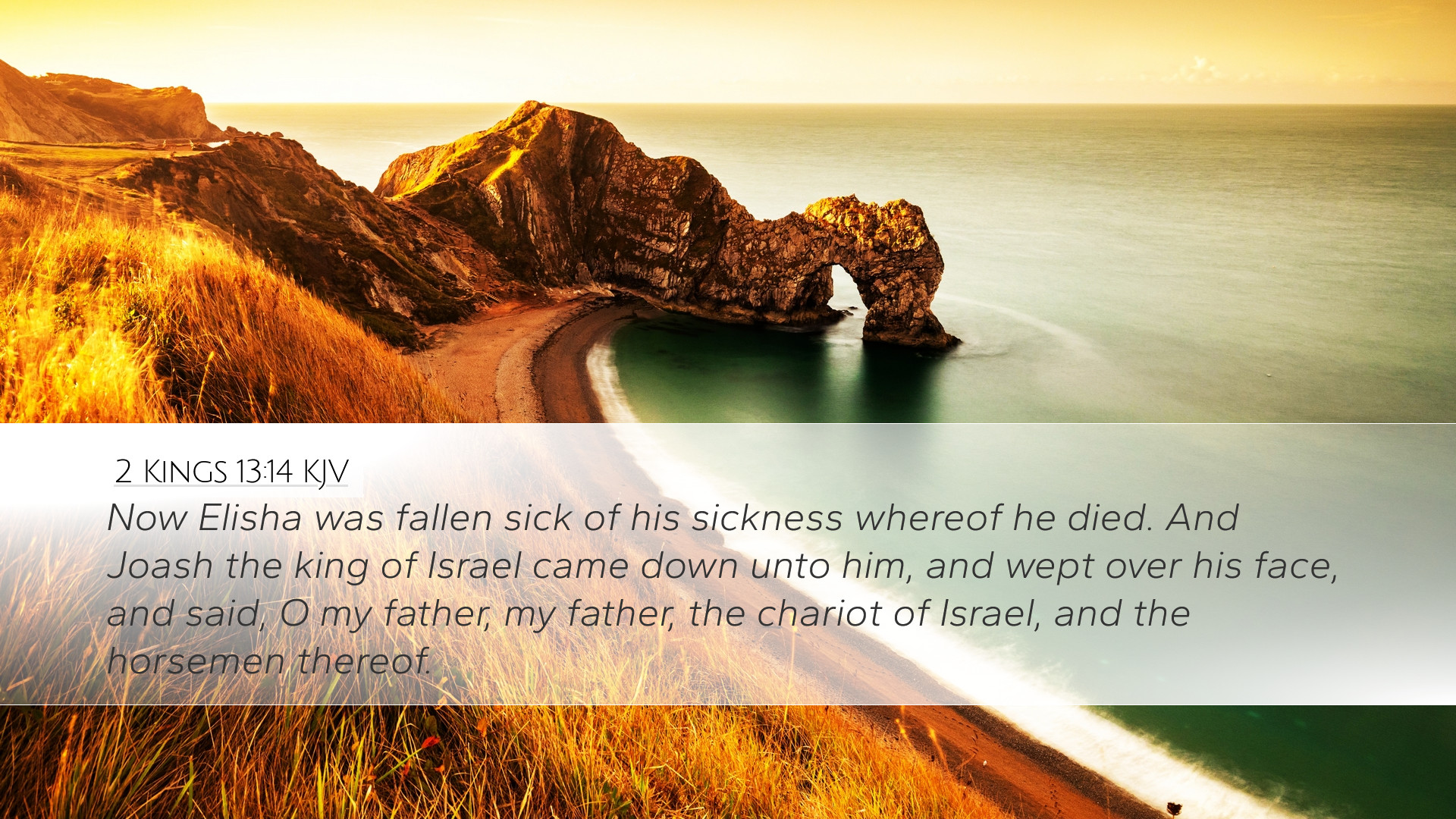Commentary on 2 Kings 13:14
Verse Text: "Now Elisha was fallen sick of his sickness whereof he died. And Joash the king of Israel came down unto him, and wept over his face, and said, O my father, my father, the chariot of Israel, and the horsemen thereof." (2 Kings 13:14, KJV)
Introduction
This verse marks a poignant moment in the historical narrative of Israel during the time of the two kingdoms. Elisha, the great prophet, is nearing his death, and his connection with King Joash highlights the spiritual and political turmoil of Israel.
Contextual Analysis
The backdrop of this passage is the declining kingdom of Israel, beset by external threats and internal decay. The mention of Elisha’s illness serves as a critical narrative device, setting the stage for a transfer of prophetic power and the continued trajectory of Israel’s spiritual legacy.
Insights from Commentaries
-
Matthew Henry
Henry emphasizes the deep personal relationship between Elisha and Joash, which transcends mere political duty. The phrase “O my father, my father” signifies both respect and a profound sense of loss. He notes that Joash recognizes Elisha as a spiritual foundation for Israel, analogous to the chariots and horsemen—symbolic of military strength—indicating that the true power of Israel lies in its prophetic leadership.
-
Albert Barnes
Barnes comments on the phrase "the chariot of Israel," interpreting it as a recognition of Elisha’s role as a protector and guide for the nation. His commentary highlights how Joash, in a moment of despair, turns to Elisha for the salvation of Israel, acknowledging that even in Elisha's death, the spiritual authority remains vital. The prophet was a bulwark against Israel's enemies, and his passing symbolizes the waning strength of the nation.
-
Adam Clarke
Clarke provides a detailed exegesis of Joash’s lament, illustrating the king's desperation in the face of impending doom. He notes the significance of the chariots and horsemen metaphor, suggesting that Joash sees Elisha as essential for divine intervention. Clarke further underscores the theme of prophetic succession, advocating that a nation's vitality depends largely on its spiritual leaders and the faithfulness of its people to the covenant.
Theological Implications
The verse invites readers to reflect on the role of prophetic voices in the life of Israel and, by extension, in the life of the church today. Elisha represents the enduring message of God amidst political uncertainty. The recognition of the prophetic ministry as a chariot reflects the indispensable nature of divine guidance.
Application for Pastors and Theologians
For pastors, this verse serves as a reminder of the weighty responsibility they carry. Just as Elisha was seen as a protector of Israel, modern leaders must also embody faithfulness, being a source of strength and guidance. Pastors should cultivate deep spiritual relationships with their congregants, understanding their influence on the spiritual health of their assemblies.
For theologians and students of the Bible, analyzing this passage encourages a deeper examination of prophetic literature and how leadership is depicted within it. The duality of strength in faith and the acknowledgment of human frailty provides a robust framework for understanding the challenges faced by leaders in faith communities.
Conclusion
2 Kings 13:14 captures a critical moment in Israel's history, reflecting not only the declining state of the nation but also the enduring impact of prophetic ministry. The lament of Joash over Elisha encapsulates the fragility of human leadership and the necessity for divinely inspired guidance in navigating life’s challenges. As we reflect on this passage, we are reminded of the timeless truths regarding reliance on God through His chosen instruments.


